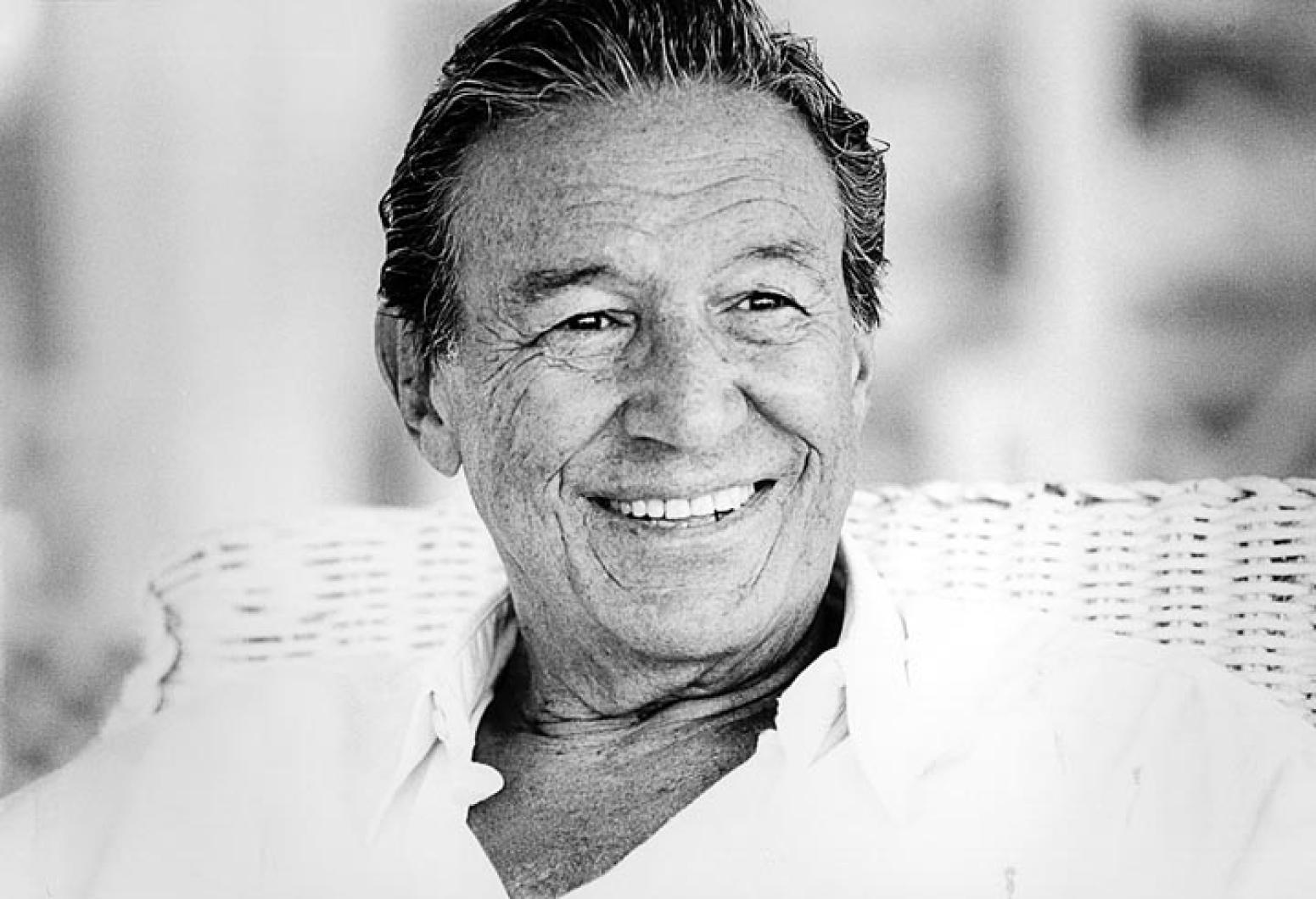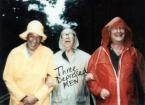Mike Wallace, the CBS newsman who was a household name across America and a longtime summer resident of the Vineyard, died on April 7 at the age of 93. The familiar television anchorman for the CBS Sunday evening show 60 Minutes was also a familiar figure on the Island, where he had visited since boyhood and later owned a home on Hatch Road in Vineyard Haven. The house was sold late last year after Mr. Wallace’s health had declined to the point where he no longer came here.
The neighborhood where Mr. Wallace lived was famously dubbed Writers’ Row because the late Art Buchwald and William Styron, among others, lived there along with Mr. Wallace; all were friends. Unfailingly handsome — whether in his trademark faded blue chambray shirt and khakis on Main street Vineyard Haven, his tennis whites at charity tournaments or an open-necked shirt and slacks on some summer stage during the political symposiums that are now an August fixture — Mr. Wallace was a visible and active member of the Island community. But he always said it was the Vineyard that gave back to him.
“You get so much from the Vineyard,” he told the Gazette in a 1993 interview. “We do. I do. Peace. Joy. Friendship. And in a strange way, roots. I don’t know why. My home is Brookline. I’ve lived in New York for 40 years. But I feel more roots in Martha’s Vineyard than anywhere in the world.”
CBS broke the story last Sunday morning that Mr. Wallace had died the night before at a care facility in New Haven, Conn., where he had lived in recent years. The news of his death and tributes quickly poured out around the country through a wide variety of print, broadcast and digital media.
The relentless broadcast reporter took on politicians, celebrities and other public figures in a 60-year career highlighted by the on-air confrontations that helped propel 60 Minutes to the top of prime-time television news programs.
In his long career Mr. Wallace interviewed Dr. Martin Luther King Jr., Malcolm X, Yasser Arafat and the Ayatollah Khomeini, among many others. And until he was slowed by heart surgery as he neared his 90th birthday in 2008, he continued doing interviews. His last appearance in television in 2008 when he interviewed the major league baseball pitcher Roger Clemens.
In an event at the Old Whaling Church in 1984, Mr. Wallace took the stage with his 60 Minutes co-host Harry Reasoner and talked about politics before an eager crowd. Ronald Reagan was running for reelection that year against Walter Mondale. “We’re in the midst, hopefully, of a presidential transition,” a woman in the audience said near the end of the event. “Are you from Chilmark?” Mr. Wallace asked her.
Myron Wallace was born on May 9, 1918, in Brookline. He began his news career in Chicago in the 1940s, first as radio news writer for the Chicago Sun and then as reporter for WMAQ. He started at CBS in 1951, left in 1955 and returned for good in 1962. In an interview with the Gazette in the late 1960s, he recalled that his broadcast career in fact began while he was a student at the University of Michigan with his classmate Jerome Weisner who would later become the president of MIT and another well-known Vineyard resident.
“We had a campus radio station then. Jerry was the radio engineer, and there was a professor named Waldo Abbott,” he recalled. “The three of us were fascinated with radio, and after that I worked with Jerry at the National Music Camp in Interlochen, Mich., and then I went to a Grand Rapids radio station. That was back in 1939, by gosh. Those were the days when you announced, and swept up, and sold time, and did absolutely everything.” Mr. Wallace served in the Navy in World War II.
When he returned to the East Coast and began working for CBS in 1951, he also reestablished his connection with Vineyard, a place he had visited since childhood when his parents rented rooms in the Rabbitt family house on the corner of Tashmoo and Main streets.
He rented for many years, nearly always in Vineyard Haven, before buying a house in 1989. In a story that has been told and retold, his friend the humorist Art Buchwald discovered an old cemetery plot on the road to West Chop in Vineyard Haven and decided they all should be buried there. In a 2004 interview with the Martha’s Vineyard Magazine, Mr. Wallace recounted the exchange. “I said, ‘you know something Artie? I’m going to get some plots for the family.’ Then I said, ‘You know how I feel about the Vineyard. Let’s say I’m buried over here. What would be a proper epitaph for me?’ We were kidding. And he said, ‘I’ve got it. Here lies Mike Wallace. He was always a renter.’ ”
In the August 1993 interview with the Gazette, on the porch of his house on the Vineyard Haven harbor, relaxed, tanned and vibrant at 75 with no plans to retire, Mr. Wallace talked about 60 Minutes which was about to begin its 26th season. “I believe that in a strange way we became an institution because we became a national ombudsman,” he said. “We were doing stories about corrupt businesspeople or politicians with their hand in the till. People who were in jail and shouldn’t be in jail. And because of the cast of reporters who were on the air . . . . We become characters. We become neighbors. We become people with whom young people, particularly, can identify. And it makes journalism much more interesting.” He added:
“I think the formula’s going to work forever.”
In an interview with the Gazette 11 years later, in 2004, his mood and outlook had changed. The booming voice of the man who had known and interviewed every sitting president since John F. Kennedy was the same, but the tone of the conversation was distinctly different, this time more deeply reflective on both a personal and professional level. “It’s a world I don’t recognize,” he confessed. “I’m bewildered by the events since 9/11. I feel I’ve been lied to, or if I haven’t been lied to, manipulated by a group of people in whom I simply do not have enough confidence — in their wisdom, their experience, their judgment. Half the country apparently still believes that the people who are leading us are competent; indeed, inspiring. And I say to myself, I’ve begun to feel this way, but how come half the country feels utterly different?”
Two years after that Mr. Wallace announced his formal retirement from 60 Minutes, although he continued to do special pieces.
He published a memoir in 2006, but The New York Times review was tepid, perhaps suggesting that his greatest strengths as a broadcast journalist were something that could not be pigeonholed into a book.
Along with his Vineyard summer pals Bill Styron and Art Buchwald, he battled debilitating depression, and spoke openly about it. His near-brush with suicide was chronicled in the 1996 HBO documentary Dead Blue. And like nearly every period in his life, this one had a Vineyard chapter. Mr. Wallace, Mr. Buchwald and Mr. Styron nicknamed themselves the Blues Brothers. “We walked around in the rain together on Martha’s Vineyard and consoled each other,” Mr. Wallace told The New York Times in a 2006 interview.
He was married four times, the last time in 1986 to Mary Yates Wallace, the widow of his close friend and colleague, Ted Yates, who had died in 1967. They were married on the Vineyard and he credited her with helping him to overcome his depression. Besides his wife, Mr. Wallace is survived by his son, Chris, a stepdaughter Pauline Dora and stepson Eames Yates. He was predeceased by his first son Peter, who died in a mountain climbing accident at age 19 in 1962.
His long list of professional awards included 21 Emmys. On the Island, he helped raise funds for numerous causes through the years, from Felix Neck Wildlife Sanctuary to Martha’s Vineyard Community Services. In 1991 he was guest conductor for the Boston Pops by the Sea concert on Cape Cod.
The Wallaces sold their Vineyard home last October to former Virginia governor and current commonwealth Sen. Mark Warner for $7 million. The house was formerly owned by Kingman Brewster, the late president of Yale University. The Wallaces had bought the house for $1.45 million in 1989. “It was kind of a tumbledown house,” he told the Martha’s Vineyard Magazine in 2004. “But the porch was there, the sailors’ bethel, the trees, the waterfront . . . Even as I talk I can see it and smell it and feel it . . . when the sun slants down from behind the house in the summer and you see the ferries coming by and the boats looking golden in the sunset, and you’re looking at the Sound — Mary and I sit there on the porch and think how lucky could we be?”







Comments (1)
Comments
Comment policy »